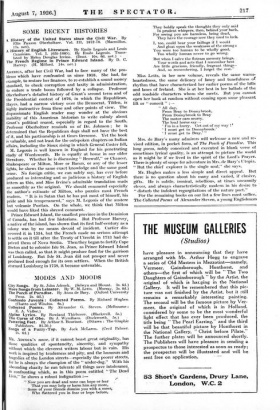SOME RECENT HISTORIES
A History of English Literature. By Emile Legouis and Louis Cazamian. Vol. I. (650.1660 ). By Emile. Legouis. Trans- lated by Helen Douglas Irvine. (Dent: - 10s. 6d. net.) • The French Regime in Prince Edward Island. By D. C. Harvey. (H. Milford. 14s. net.) AMERICA, after her Civil War, had to face many of the pro- blenis which have confronted us since 1918. She had, for example, to restore her finances, to re-establish a sound money standard, to check corruption and laxity in administration, to endure a trade boom followed by a collapse. Professor Oberholtzer's detailed history of Grant's second term and of the Presidential contest of 1876, in which the Republican, Hayes, had a narrow victory over the Democrat, Tilden, is highly instructive from these and other points of view. The. dispassionate English reader may wonder at the obvious inability of this American historian to write calmly about Grant's political record, especially in regard to the South. Professor Oberholtzer reminds us of Dr. Johnson ; he is determined that the Republican dogs shall not have the best of it, and his partisanship is at times tiresome. Yet the book is valuable, and not least for the outspoken chapters on Indian affairs, including the Sioux rising in which General Custer fell.
M. Legouis is well known in England for his penetrating study of Wordsworth. He is equally at home in our older literature. Whether he is discussing " Beowulf," or Chaucer, Shakespeare or Milton, More or Bacon, or any of the lesser lights, he shows the same exact knowledge and the same good sense. No foreign critic, we can- safely say, has ever before produced so interesting and so judicious a history of English letters as this, and Miss Irvine's admirable translation reads as smoothly as the original. We should commend especially the author's estimate of Milton, who puzzles most French readers. " It is in Satan that he has put most of himself, his pride and his temperament," says M. Lcgouis of the austere but volcanic Puritan. On the whole, we think that Milton would have liked this shrewd comment.
Prince Edward Island, the smallest province in the Dominion of Canada, has had few historians. But Professor Harvey, a native of the island, has shown that its first half-century as a colony was by no means devoid of incident. Cartier dis- covered it in 1534, but the French made no serious attempt to settle on it till after the Treaty of Utrecht in 1713 had de- prived them of Nova Scotia. Thenthey began to fortify Cape Breton and to colonize Isle St. Jean, as Prince Edward Island was then called, so that it might produce food for the garrison of Louisburg. But Isle St. Jean did not prosper and never produced food enough for its own settlers. When the British stormed Louisburg in 1758, it became untenable.






































 Previous page
Previous page